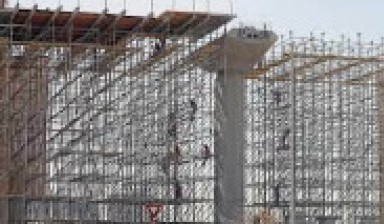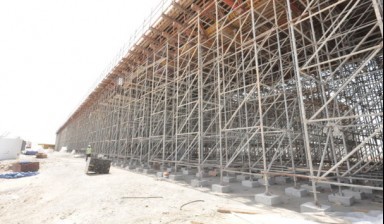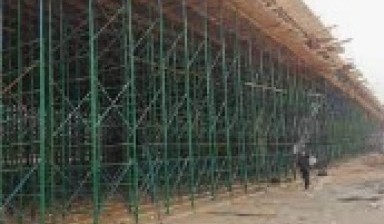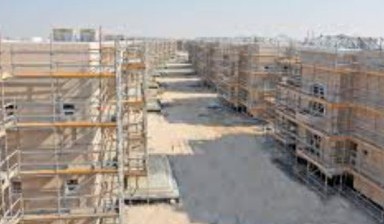- Home
- UAE
- Construction equipment rental
- Formworks and components
Formworks and components in the UAE
Search of formworks and components in the UAE
Formwork is a temporary structure set up to ensure that the poured liquid concrete mixture takes on the desired shape as it hardens. The design must support not only the weight of the concrete but also the forces generated during its compaction. Formwork can be either removable or non-removable. Non-removable formwork is used in monolithic construction and is not available for rental. It is made from polystyrene and, after the concrete is poured, becomes part of the wall, providing additional thermal and sound insulation. Removable formwork, which will be discussed below, is removed after the concrete has set.
When is it Beneficial to Rent Formwork for a Certain Period?
It is advantageous when constructing a single object or in cases where it is difficult to plan the need for formwork structures, such as with small or irregular construction volumes. Renting formwork allows for faster construction timelines, eliminates the need for additional storage space, and alleviates concerns about its technical condition and maintenance. Young companies that do not have sufficient funds to purchase a complete set of equipment may find leasing formwork suitable. This involves renting with the option to purchase at residual value.
Classification of Formwork
There are two fundamentally different types of formwork depending on what parts of the structure they are used to erect:
- Horizontal Formwork: Used for ceilings and overpasses. The set includes tripods, telescopic supports, head-corns, laminated plywood, and I-beams. The supports have threaded couplings that allow for precise positioning of the panels.
- Vertical Formwork: Used for walls, foundations, elevator shafts, and columns. A classic vertical stationary design, used for a long time to create rectangular strip foundations, consists of wooden panels made from boards connected by beams. They are installed on a horizontal surface and fixed in place using fastening pegs, braces, wooden clamps, struts, and frames. For formwork heights up to 20 cm, boards with a thickness of 40-50 mm are used. Before pouring concrete, the structure is moistened with water. Gaps up to 3 mm are sealed after the wood swells, while larger gaps must be filled with tow or strips.
Types of Formwork by Design:
- Large and small panel formwork
- Block formwork
- Sliding formwork
- Volume or lift-shift formwork
- Horizontally movable formwork
Types of Formwork by Material:
- Steel
- Aluminum
- Plastic
- Wood
Galvanized or galvanized steel formwork is convenient because it has high load-bearing capacity and good resistance to deformation. The protective coating prevents corrosion, and cleaning the elements is quick and easy. However, it is heavy and has high thermal conductivity. Aluminum formwork does not require protection due to its corrosion resistance. Silicon is added to the alloy to ensure necessary strength. This type of formwork is three times lighter than steel, making transportation and installation cheaper and easier. However, it is more susceptible to deformation and has a shorter lifespan compared to steel, as well as challenges in repair (argon welding is required). For this reason, aluminum formwork rental is less common.
Wooden formwork is cost-effective, strong, and can withstand mechanical loads well. One of its main disadvantages is its hygroscopicity. Moisture absorption reduces the load-bearing capacity of wooden elements, leading to deflection. Additionally, broken parts of wooden formwork are not always repairable.
Types of Formwork Systems:
- Frame Formwork: Composed of frame panels, supporting elements, and fastening details. The panel is assembled as a plate fixed to a metal frame with stiffening ribs.
- Beam Formwork: Includes panels, beams with steel tips, fastening and supporting elements, scaffolding, girders, and platforms for concrete pouring.
- Tunnel Formwork: Assembled from half-sections, each consisting of vertical and horizontal panels. It is used for the mass production of standard products.
Where to Rent Formwork?
SpecGo allows direct interaction between construction equipment owners and customers, so formwork rental on the site is conducted without intermediaries. You can request formwork rental services for construction from any city in the UAE; you just need to leave your application. The cost per shift or hour of rental should be confirmed with the selected contractor from the advertisement. Formwork rental is conducted by verified owners, ensuring the quality of work is not in question!


-
+971565571981 WhatsApp
| Equipment brand | PSK |
| Boom load capacity | 1 t. |
| Size | 1.5-3.3 m² |
| Main type | telescopic |
| Formwork type | for walls |
| Work experience | more than 10 years |
| Payment method | cashless payment |
| Payment procedure | Payment by the fact |
 WhatsApp chat
WhatsApp chat



-
+971542522020 WhatsApp
| Equipment brand | DURISOL |
| Boom load capacity | 3 t. |
| Size | 1.7-3.1 m² |
| Main type | telescopic |
| Formwork type | for walls |
| Work experience | more than 10 years |
| Payment method | cash/cashless |
| Payment procedure | Prepayment |
 WhatsApp chat
WhatsApp chat


-
+971506784571 WhatsApp
| Equipment brand | GEOPLAST |
| Boom load capacity | 2 t. |
| Size | 0.75*3 m² |
| Main type | plastic |
| Formwork type | for walls |
| Work experience | 7 years |
| Payment method | cash/cashless |
| Payment procedure | Payment by the fact |
 WhatsApp chat
WhatsApp chat


-
+971544659015 WhatsApp
| Equipment brand | PERI |
| Boom load capacity | 2 t. |
| Size | 3*3.3 m² |
| Main type | plastic |
| Formwork type | for walls |
| Work experience | more than 10 years |
| Payment method | cash/cashless |
| Payment procedure | Prepayment |
 WhatsApp chat
WhatsApp chat


